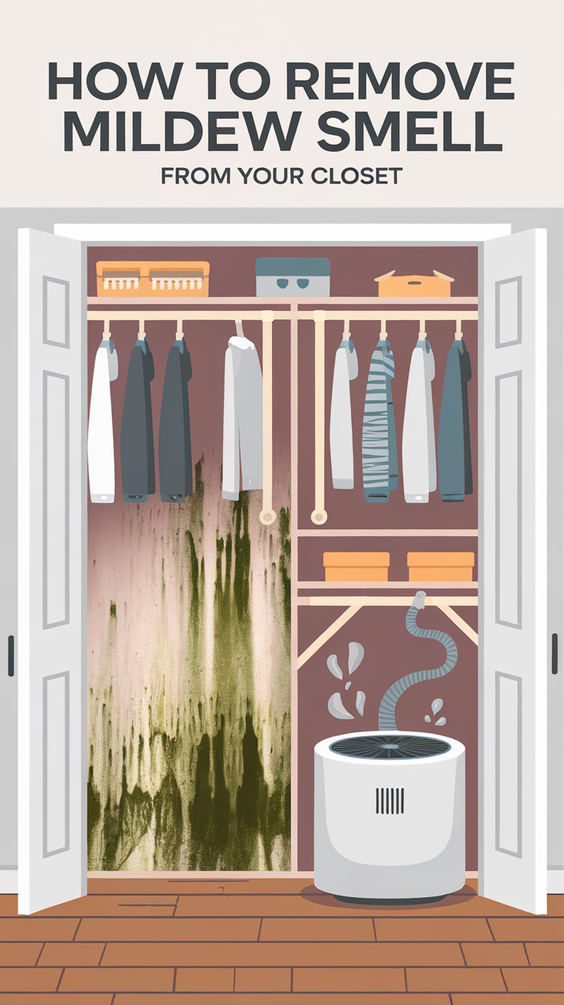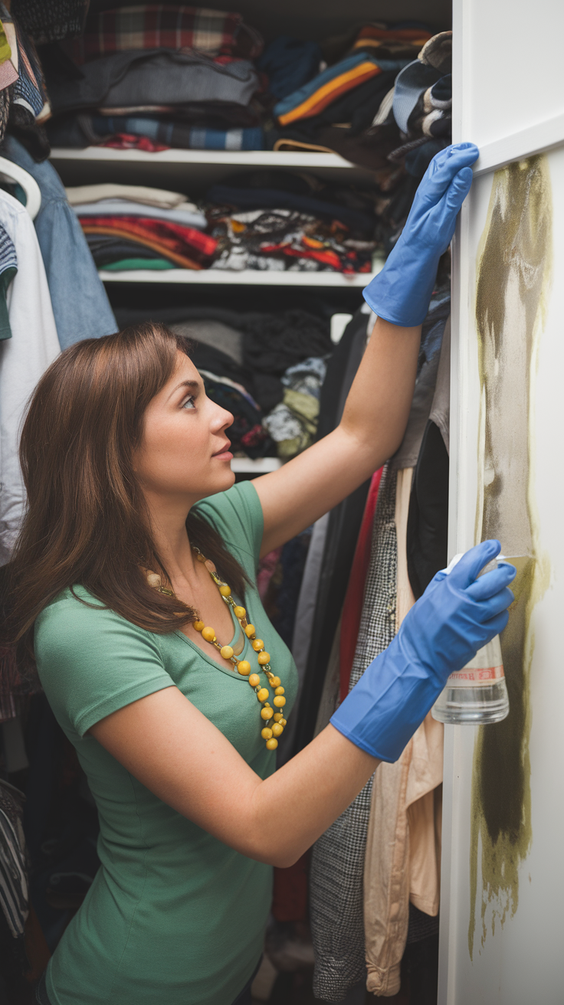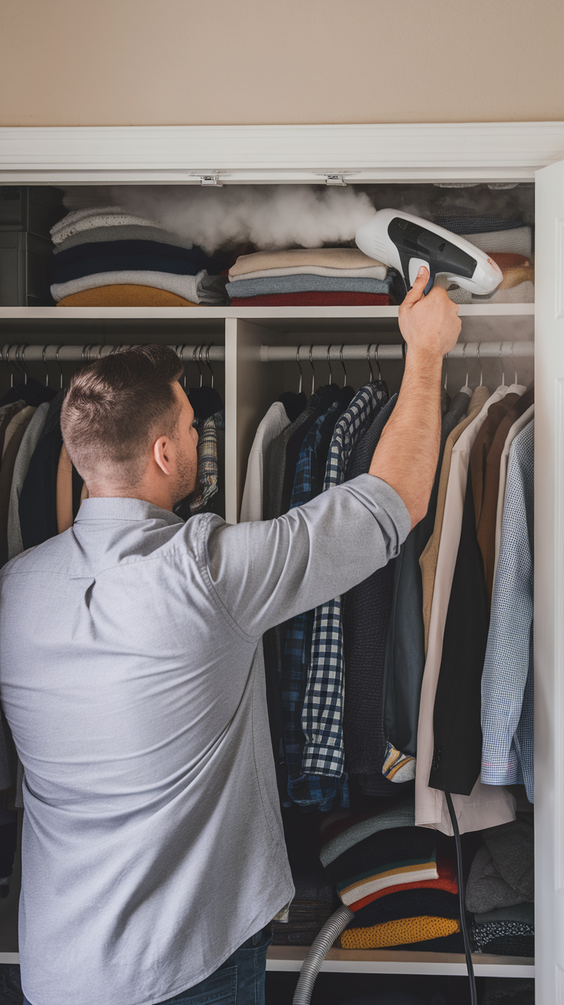How to Remove Mildew Smell from Your Closet in 2025: A Step-by-Step Guide That Works

One whiff of that musty closet smell instantly takes you back to the feeling of opening it for the first time. Ever felt that? The scenario plays out for a large population of the United States where musky odors are frequent occurring phenomena in homes with poor ventilation. In 2025 alone, mildew musky odors are expected to become the most prevalent issue in U.S households. Though, the smell seems smaller in scale, it indicates a bigger threat: hidden moisture, mold growth, and health risks.
Mold growth does not seem to have much halting an issue.
The bigger concern is: does mildew odor leaving a stagnant feeling causing the closet to halt growth and adversely impacting hygiene?
You can get rid of the odor and stop it from returning, all with removal of health concerns.
The goal of this detailed guide is to demonstrate how to use proven steps to eliminate closet odor by providing users with flexible tips along with modern tools accessible in 2025. It won’t matter if you were residing in a suburban home or apartment, by the end of this guide, you will have peaceful and uncluttered closet minus sniffing noises.
👤 Who should read this?
This article is designed for homeowners, renters, or anyone who stores clothes in a damp or enclosed closet and wants it to smell fresh again.
What Causes Mildew Smell in Your Closet?
Let’s start at the root of the problem: Why does your closet smell musty in the first place?
The mildew odor is caused by microbial growth — typically mold or mildew — that thrives in moist, dark, and poorly ventilated areas. Closets, unfortunately, tick all those boxes.
Main Causes Include:
Poor air circulation
Damp or unwashed clothes
Leaky roofs or pipes nearby
Storing wet shoes, towels, or bags
High humidity levels in the home
And here’s the kicker: due to climate shifts and tighter home insulation in 2025, these conditions are even more common now than they were five years ago.
💡 Did you know? According to the EPA, relative humidity above 60% in a closet can trigger mildew in less than 48 hours.
How to Identify the Source of the Mildew Smell
Before you can remove the smell, you need to figure out what’s causing it.
Hidden Mold or Just Stale Air?
Don’t assume the odor is just “old air.” Mold can hide behind closet panels, under carpeting, inside bags, and even within folded fabrics. Start with a visual and smell inspection.
Here’s a quick checklist to help you pinpoint the problem:
✅ Check the back walls and corners for black or green spots
✅ Inspect wooden shelves for softness or discoloration
✅ Smell shoes, coats, and old boxes
✅ Look for recent leaks or signs of water damage
👃 Tip: Trust your nose. The stronger the odor, the closer you are to the source.
Step-by-Step Guide to Remove Mildew Smell from Your Closet
Ready to tackle the stink? Follow this proven, step-by-step process to eliminate mildew odors completely.
Step 1 – Empty the Closet and Isolate Affected Items
Take everything out. Yes, everything.
Place clothes, shoes, and boxes in a dry, well-lit space. Separate anything that smells strongly of mildew — it’s either contaminated or absorbing the odor.
⚠️ Pro Tip: Wear gloves and a mask if mold is visible. Spores can be hazardous.
Step 2 – Deep Clean Interior Surfaces
Now it’s time to attack the root cause.
Mix one of the following natural cleaning solutions:
| Solution | Mix Ratio | Safe For |
|---|---|---|
| White Vinegar | 1:1 | Walls, shelves |
| Baking Soda | Sprinkle + water | Deodorizing wood or plastic |
| Hydrogen Peroxide (3%) | Full strength | Moldy surfaces (avoid fabrics) |
Use a sponge or microfiber cloth to scrub walls, ceiling, floors, and shelving. Don’t forget corners and behind rods.
Let everything air dry for at least 4-6 hours, ideally in sunlight or with a fan.
Step 3 – Wash or Dry-Clean All Clothing
Mildew smell clings to fibers.
Machine-wash clothes using hot water (if fabric allows) with baking soda or vinegar in the rinse cycle.
Dry-clean anything labeled “dry clean only.”
Discard items that are visibly moldy or have absorbed strong odors beyond repair.
🧺 Bonus Tip: Use a garment deodorizer spray with tea tree oil or activated charcoal to refresh mildly affected clothes.
Step 4 – Dry Everything Thoroughly Before Re-Storing
Moisture is the enemy. Ensure both closet surfaces and clothing are completely dry before you put anything back.
Use a dehumidifier, blow dryer, or fan in the closet.
Dry clothes outdoors or in a well-ventilated area.
Wait at least 24 hours before restoring order.
Natural Remedies to Absorb and Neutralize Odors
Even after cleaning, it’s smart to leave a natural deodorizer in your closet to keep it smelling fresh.
Top 5 Natural Deodorizers:
| Deodorizer | Placement | Lasts For |
|---|---|---|
| Baking Soda Box | On shelf or in bowl | 30 days |
| Activated Charcoal | In pouch or jar | 60–90 days |
| Coffee Grounds | Open jar (away from clothes) | 2–3 weeks |
| Tea Tree Oil Cotton Balls | In dish on shelf | 1 week (refresh weekly) |
| Cat Litter (unscented) | Sock or mesh pouch | 1 month |
Change them regularly to maintain effectiveness.
How to Prevent Mildew Smell from Returning
The best defense is prevention. Here’s how to keep your closet smelling like fresh laundry every day.
Improve Air Circulation
Closets need to breathe.
Leave doors slightly ajar when possible
Add a small battery-powered fan or install vent grills
Avoid overpacking — allow air flow between garments
Use Moisture Absorbers or Dehumidifiers
For humid climates or basements, consider tech-based solutions.
2025’s top-rated closet dehumidifiers:
| Model | Price | Coverage | Features |
|---|---|---|---|
| Eva-Dry EDV-1100 | $40 | 1100 cu. ft. | Silent, compact, refillable |
| DampRid Refillable | $10 | Small closets | Fragrance-free, absorbs instantly |
| Pure Enrichment Mini | $60 | 200 sq ft | Built-in nightlight, USB powered |
Adopt Smart Storage Habits
Storage matters more than you think.
Never put damp items in the closet
Use breathable garment bags
Avoid storing dirty laundry, old shoes, or unsealed containers
❓ Ever store gym clothes “just for a day” and forget? That’s all mildew needs to grow.
Common Mistakes That Make Closet Odors Worse
Think your cleaning efforts failed? You might be repeating one of these common mildew mistakes:
Using plastic bins that trap moisture
Storing clothes too tightly with no air flow
Ignoring leaky HVAC vents or pipes nearby
Using air fresheners instead of actual odor neutralizers
Avoid these, and your closet will thank you.
Best Odor Removal Products in 2025 (Editor’s Picks)
Here’s a quick look at the top products of 2025 for mildew odor removal:
| Product Name | Use Case | Avg. Price |
|---|---|---|
| Gonzo Odor Eliminator | Closet deodorizer | $9 |
| Lysol Mold & Mildew Spray | Mold removal | $6 |
| DampRid Hanging Bags | Moisture control | $12 |
| Moso Natural Air Purifying Bag | Odor absorption | $20 |
| ClosetMate Electric Dehumidifier | Full closet drying | $45 |
These options work well alone or in combination.
What If the Smell Still Won’t Go Away?
If after everything the mildew smell persists, it might be a structural problem:
Mold inside the drywall or subfloor
A hidden plumbing leak
HVAC issues venting into the closet space
Call a mold remediation professional to assess the situation. It’s worth the investment to protect your health and property.
Quick Summary: What to Remember
✅ Mildew thrives in dark, damp, poorly ventilated closets
✅ Clean all surfaces with vinegar, peroxide, or baking soda
✅ Wash and fully dry clothes before storing
✅ Use deodorizers and dehumidifiers to maintain freshness
✅ Avoid plastic storage and overpacking
What’s Your Secret Weapon Against Closet Odors?
Have you ever tackled a musty closet and won the battle?
What natural trick or product worked best for you?
👉 Share your story in the comments — or your favorite odor-fighting product!
👉 Found this helpful? Don’t forget to share it with a friend who needs a fresher closet!


